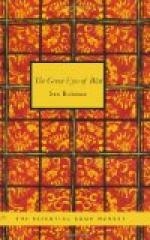During eleven months of every year it would have been possible—– although I considered it undesirable—for her to have appeared in public unveiled. She possessed features of perfect Ancient Egyptian regularity. I emphasize the point. Her eyes, during the day, were those of a handsome native woman—almond-shaped and of a wonderful amber color. At night they appeared green.
Of her fingers, toes, and the peculiar formation of certain teeth I have spoken at length (another reference to a deleted passage). I will deal, now, with those manifestations which proclaimed themselves during the Sothic month of each year formerly associated with the Feast of Bast.
At such times, which I always dreaded, and with good cause, her innate love of admiration became so excessive as to approach nearly to mania. She hungered for homage, for praise—I had almost said for adoration.
What I may term, for convenience, the psychic side of her hybrid mentality at these periods undoubtedly bordered closely upon true insanity; and learning from the Eurasian nurse to whom I have referred the whole history of her birth, my charge, to whom I had given the name of Nahemah (students will recognize its significance), began to display even more marked evidence of a sort of monomania. Bast, the cat-goddess, became an obsession with her, and she finally conceived the idea that the attributes of that mystical and partly-understood deity were active within her; that she was Bast, re-born. And, certainly, during one month of every year, her condition closely resembled that which was termed in the Middle Ages “possession.”
At such times, moreover (a phenomenon with which I have dealt at length in my work on the subject), she evinced an antipathy towards the whole of the canine species which was reciprocated in a singular way. Thus, when, contrary to my express orders, she has wandered abroad during the Sothic period, I have been enabled to trace her movements by the progressive howling of dogs.
Since I had enjoined the nurse to be silent upon all things bearing upon Nahemah’s birth, I was enraged at this breach of faith and sent the woman away. But a new situation had been created which I found myself called upon immediately to face.
Nahemah demanded news of her family. As I have made sufficiently evident, it was often difficult, if not impossible, to thwart the desires of my protegee. To condense into a few words a matter which occasioned me long and anxious thought, I may say that I made the necessary arrangements for quitting the house near to the Mosque of Muayyad which had been my home for fifteen years.
I recognized the danger of Nahemah’s traveling in the ordinary way, and she performed the journey to England in the character of an invalid under my professional care. Equally, residence at any public establishment was out of the question, and although I found myself compelled for a time to court discovery by lodging Nahemah in a private suite in an obscure hotel, I hastened to seek a house in some quiet suburb which should reproduce as nearly as possible the advantages of my abode in Cairo.




